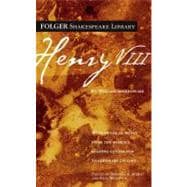
| Editors' Preface Shakespeare's | |
| Henry VIII Reading | |
| Shakespeare's Language | |
| Henry VIII Shakespeare's Life | |
| Shakespeare's Theater | |
| The Publication of Shakespeare's Plays | |
| An Introduction to This Text | |
| Henry VIII Text of the Play with Commentary Longer | |
| Notes Textual | |
| Notes Appendix on Authorship | |
| Henry VIII:A Modern Perspectiveby | |
| Further Reading Key to Famous Lines and Phrases | |
| Table of Contents provided by Publisher. All Rights Reserved. |
The New copy of this book will include any supplemental materials advertised. Please check the title of the book to determine if it should include any access cards, study guides, lab manuals, CDs, etc.
The Used, Rental and eBook copies of this book are not guaranteed to include any supplemental materials. Typically, only the book itself is included. This is true even if the title states it includes any access cards, study guides, lab manuals, CDs, etc.
InHenry VIII,the last of his plays about English history, Shakespeare presents monarchy in a state of crisis. Noblemen are embattled with the enormously powerful Lord Chancellor Cardinal Wolsey, as both parties level charges of treason against each other almost indiscriminately. Wolsey, without the king's knowledge, has taxed the people to the point of rebellion. Yet the politics of the play are so subtle that the true cause of this crisis is not clear. In the case of the duke of Buckingham, for example, witnesses brought before Henry by Cardinal Wolsey claim that the duke, deceived by the prophecies of an evil monk, is conspiring to usurp Henry's throne. Nonetheless, as Buckingham goes to his death for treason, he seems the innocent victim of suborned testimony. Perhaps, then, the root of the crisis is Henry's failure to recognize Wolsey's exploitation of the king's favor, which, we learn later, has enabled him to amass a huge fortune through extortion and to feed his own pride and spite. Or perhaps the crisis arises from the ambition of noblemen who would strip Henry and his heirs of the throne.
The monarchy also faces a succession crisis, for Henry is without a male heir. Though Henry's queen, Katherine, has been pregnant many times, all but one of the pregnancies have resulted in miscarriages or in infants who died soon after birth. Worse, the single survivor is the girl Mary. After meeting the young and beautiful Anne Bullen, one of Katherine's ladies-in-waiting, Henry says that he is tormented by the suspicion that God has denied him a male heir because his marriage to Katherine -- the widow of his brother -- is invalid. The royal marriage begins to come apart. Again the precise nature of the crisis is put in question. Is Henry indeed experiencing a crisis of conscience about the sanctity of his marriage, or is he experiencing a crisis of desire provoked by the opportunity to take the young and beautiful Anne as a new wife and queen?
Whatever the ethics of Shakespeare's Henry, Katherine's integrity glows so splendidly in the play's action and dialogue that her role has long been coveted by actors. She first takes the stage as the advocate for all the English people crushed by Wolsey's oppressive taxes, and then she is properly suspicious, as Henry is not, of the motives of the witnesses who send Buckingham to his death. Her fierce opposition to Wolsey is repeatedly justified by the play's depiction of the cardinal's vices. When she is summoned to the church court that is deliberating on the propriety of her marriage, her defense of her conduct as Henry's wife is resounding in its eloquence. She has been admired for centuries by readers and playgoers alike.
After you have read the play, we invite you to turn to the essay printed after it,"Henry VIII:A Modern Perspective," by Barbara A. Mowat of the Folger Shakespeare Library.
Copyright © 2007 by The Folger Shakespeare Library
Excerpted from Henry VIII by William Shakespeare
All rights reserved by the original copyright owners. Excerpts are provided for display purposes only and may not be reproduced, reprinted or distributed without the written permission of the publisher.